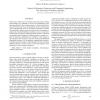Free Online Productivity Tools
i2Speak
i2Symbol
i2OCR
iTex2Img
iWeb2Print
iWeb2Shot
i2Type
iPdf2Split
iPdf2Merge
i2Bopomofo
i2Arabic
i2Style
i2Image
i2PDF
iLatex2Rtf
Sci2ools
ICASSP
2009
IEEE
2009
IEEE
A criterion for the enhancement of time-frequency masks in missing data recognition
Despite their effectiveness for robust speech processing, missing data techniques are vulnerable to errors in the classification of the input speech signal’s time-frequency points. A direct method for the removal of these mask errors is through the top-down optimization of the estimated mask, however this requires a measure to evaluate the mask quality without a priori noise knowledge. In this paper we propose the normalized likelihood confidence as such a criterion for robust speaker recognition. In this approach the accuracy with which an estimated mask classifies time-frequency points as corrupt or reliable is related to its likelihood score confidence. This is based on the conceptual effect of binary mask errors on the model likelihood distributions produced by accumulated marginalization densities. Experimental results confirm a relationship between the normalized likelihood distance and the accuracy of the time-frequency mask produced by various estimation strategies.
| Added | 21 May 2010 |
| Updated | 21 May 2010 |
| Type | Conference |
| Year | 2009 |
| Where | ICASSP |
| Authors | Daniel Pullella, Roberto Togneri |
Comments (0)

